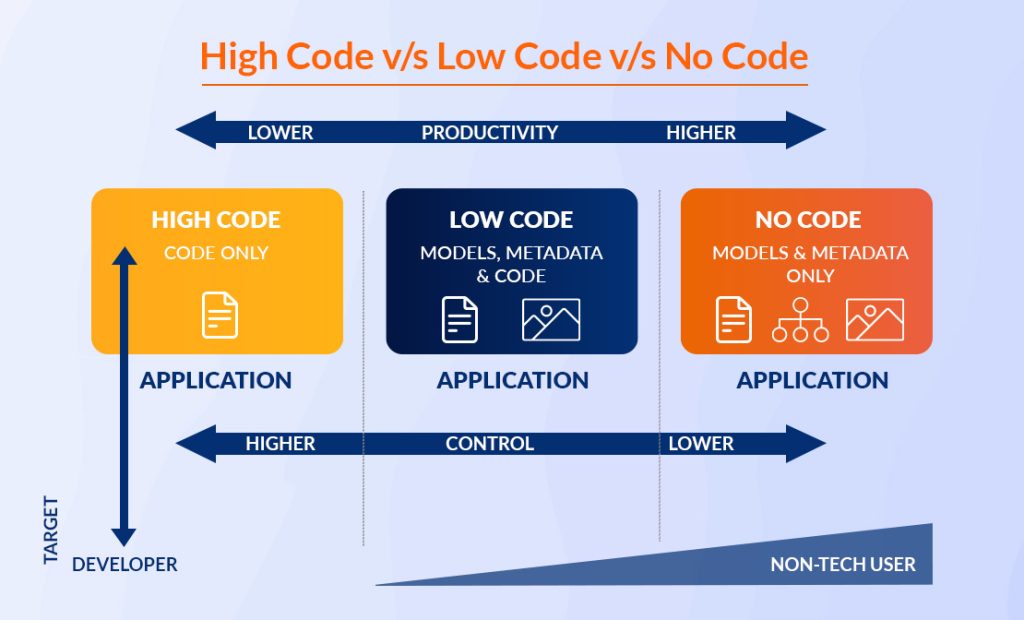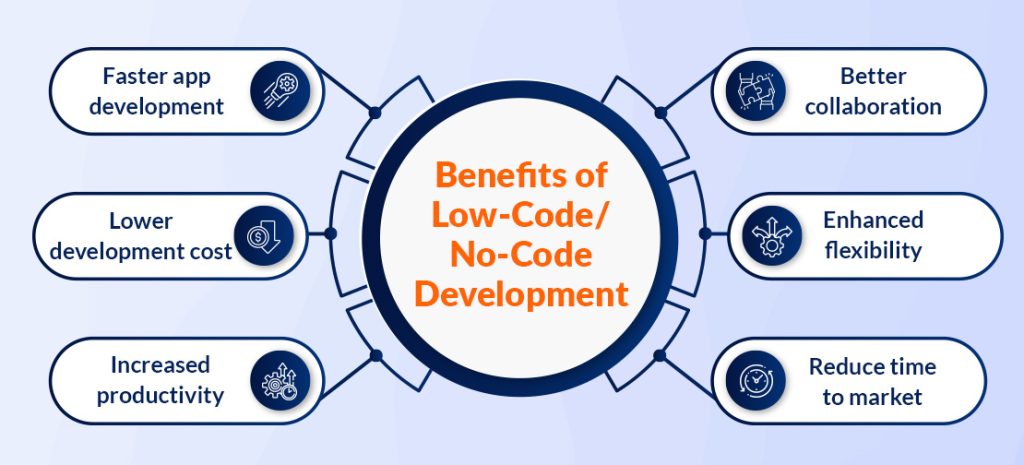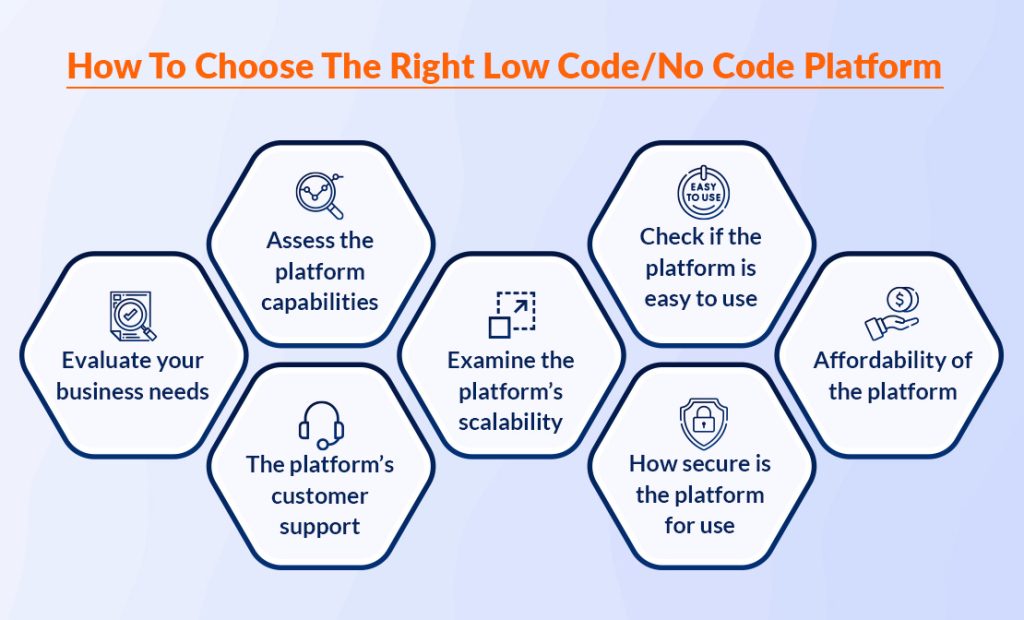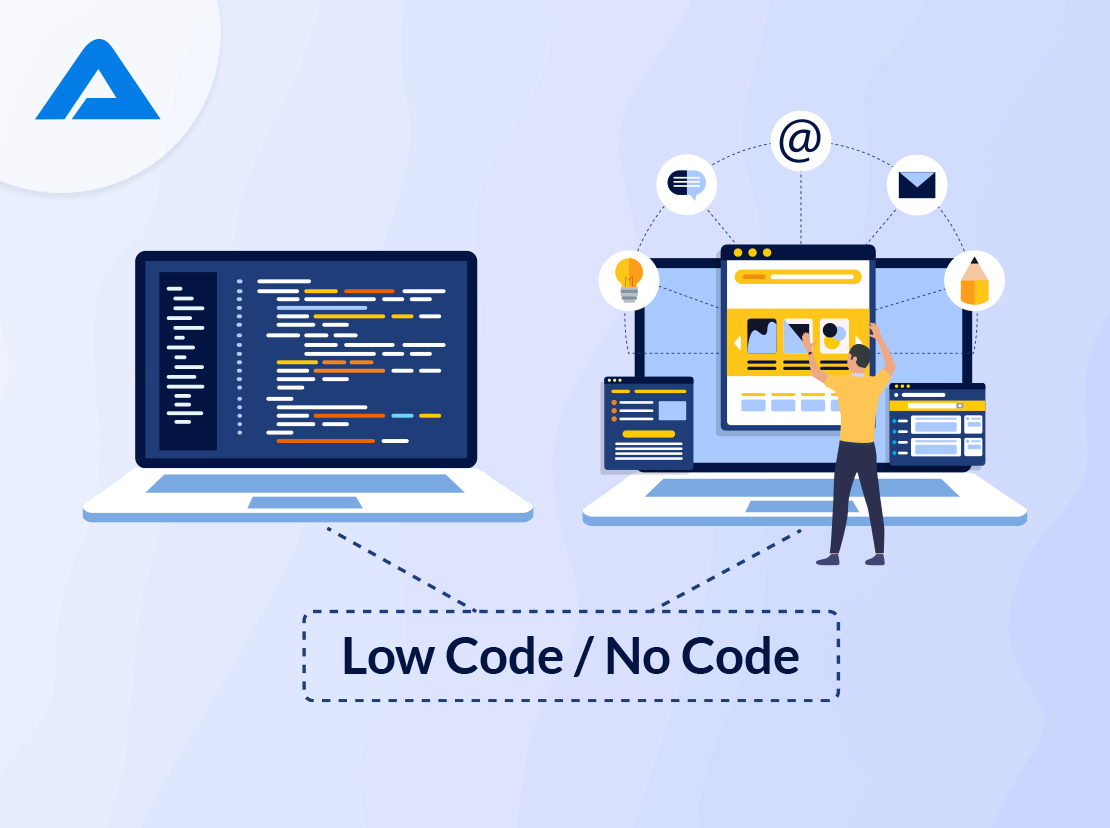Businesses leverage software programs to run their businesses and perform repetitive activities. They use software for better operational efficiency and to scale their business. Consequently, the demand for software development services had gone up, and inevitably software development agencies came under pressure as businesses wanted faster delivery with no bugs.
This gave birth to the idea of no/low code software development, which reduced the time taken to finish the project and the number of bugs. The new development ensured many benefits for software development companies and businesses.
Are you a businessman looking to develop software or an app for your business? Here is everything you need to learn about no/low code development for better investment value.
What is Low Code/No Code Application Development?
Low/no-code app development is creating software applications without writing extensive lines of code. Instead, it utilizes visual drag-and-drop interfaces, pre-built templates, and other tools to simplify the development process.
The approach has become increasingly popular in recent years, allowing organizations to create applications faster and with less technical expertise. Gartner says that over 65% of app development will be low/no code.
The benefits of using low/no-code platforms are many. It enables non-technical teams to develop and deploy applications, reduces development time, and can lead to significant cost savings. Low/no-code app development also improves collaboration and communication between teams and departments.

The Benefits Of Low/No-Code Application Development
While we have touched upon the idea of low-code development and how businesses prefer no-code development, let’s now understand why businesses prefer this method over others.
Here are a few essential benefits that businesses can enjoy if they opt for no code development methodology:

Faster app development
As the name implies, no code development does not require writing extensive codes to develop the application. Hence, a software development company can easily create and deliver the prototype to the client. This ease of development also allows the developers to make quick changes to the prototype and final delivery.
Lower development cost
Usually, a software developer must use various resources and working hours when developing an application. With no code development, that’s not necessary. This helps the business bring down the cost of development in terms of money, working hours, and efforts.
Increased productivity
One of the best ways no-code platforms can be used is to automate mundane or repetitive tasks in the development cycle. This enables developers to evaluate complex tasks better and focus on them. The result is an impeccable application that didn’t take much time to develop.
Related Article: Must-have On-Demand Mobile App Clones For the Startups in 2022
Better collaboration
Low-code platforms make it easier for people, even without technical knowledge, to understand the process. Hence, even non-technical stakeholders can become a part of the process and contribute. Collaboration between the development and business teams can improve the final product.
Enhanced flexibility
When an app development agency uses a no or low-code platform, it gives them the flexibility they need to work on the project. They can create highly complex and expansive applications such as ERP and CRM to small apps for automation. As a result, development companies of any size can get into the process.
Reduce time to market
Every business wants to develop and test products faster to bring them to the market quicker for competitive advantage. With a low/no-code development philosophy, reducing the time to market for any product is much easier. The prototype development and testing would take little time, unlike classic SDLC.
Where Can You Use Low Code/No Code App Development?
The concept of low-code app development can be used in a range of situations as the business prefers. Some of the most common uses include:
UI/UX development
There is no doubt that developing an appealing and functional user interface is complex. However, with a low-code development process, businesses can expedite this process. As a result, they can develop various UI options for specific technologies and environments, from mobile devices to desktops.
Web app development
Web app development is another area where code development can only be used sparingly. A business can vet their requirements and expand upon them when adopting a low-code methodology. This will help them quickly change their needs as they fit and develop an excellent web app.
Mobile app development
With multiple mobile platforms in the market, businesses always need help creating apps for each platform. Thanks to low development, however, businesses can take that pressure off their shoulders as it allows quicker and faster mobile app development. This also allows businesses to live up to all their goals.
Business process automation
A business has to carry out a plethora of processes every day to ensure optimum performance. Most of these processes may be repetitive and mundane. With a low-code development strategy, businesses can develop apps to automate these processes as the business would need.
Wearables development
Wearables have become extremely popular, and every business wants to get on the wagon to offer wearables. Businesses can now do that easily by adopting the low-code methodology, as it would expedite their prototyping, development, and time to market.
API development
APIs have become an integral part of today’s digital business world. APIs are crucial for user satisfaction and engagement, from making payments to accessing user accounts and sharing information online. With a unique low-code development strategy, businesses can quickly develop APIs for almost everything.
How to Choose the Right Low Code/No Code Platform
With so many benefits to enjoy, no code development strategy must be an essential part of every business’s digital policy. However, to enjoy all the benefits of the methodology, you also need to ensure that you are choosing the right platform.
Several low/no-code platforms are in the market now, from Appian, Mendix, and Quick Base to Zoho Creator.
But how will you choose the best one?
Don’t you worry! Here are a few factors that you must consider when selecting a platform to ensure that you are making the best choice:

Related Article: Readymade Software vs Custom Software Which One is a Better Choice?
Evaluate your business needs
Before considering multiple platforms to choose for low-code development, you need to assess your business’s goals. Examine the same and create a requirement list to help narrow down the platform choices.
Assess the platform capabilities
Once you are down with the requirements, the next logical thing is to consider the capabilities of the platforms you have in mind. Evaluate if they can meet your goals and expectations without trouble or third-party support.
The platform’s customer support
One of the essential aspects of no-code development is the support you get. Hence, the platform must have timely customer service on priority for you. You must be able to talk to a live person if something is not correct or working.
Examine the platform’s scalability
As a business, you may need to scale your project as you grow or as your requirements grow. Hence, you need to check the platform for scalable. If they offer scalable services, you can go with them if they meet your other criteria.
Check if the platform is easy to use
Another factor to consider is the ease of use guaranteed by the platform. Some platforms are easy to use and develop apps, while others have a significant learning curve. Therefore, check if the platform is easy to use to save time.
How secure is the platform for use
Since you would be using a lot of data to develop the project, the security of the data is also essential. Hence, evaluate how secure the platform is and the security and privacy systems in place at the platform before making a choice.
Affordability of the platform
This is another crucial aspect of your decision-making process. The cost must be reasonable with the services that the platform offers. Compare the pricing with other platforms and plans and the one that justifies your budget and meets your goals.
Conclusion
The advantages of using low-code development in your app development strategy are immense. You get to save your money and make apps faster. You can reach your users faster and improve your business operations considerably. If you are a business thinking about growing, then no-code development must be in your strategy.
If you are considering using the low-code methodology to develop your next app, considering an experienced and expert no-code development company like AddWeb Solution can be beneficial.
We have been working in the industry for over a decade and have pioneered the low-code development methodology. Over the years, we have worked with some leading global brands and helped them take full advantage of low-code development strategies. Our team at AddWeb Solution can do that for you, too.
Frequently Asked Questions
NCLC accelerates application development, reduces reliance on IT teams, and allows business users to actively participate in creating solutions. It results in faster time-to-market, cost savings, and increased agility in responding to business needs.
NCLC platforms can be used to build a wide range of applications, including business process automation tools, customer portals, data dashboards, and even complex workflow applications, all without extensive coding.
NCLC platforms provide a user-friendly interface, allowing non-technical users to create applications without learning complex coding languages. This democratizes application development and promotes collaboration between IT and business teams.
NCLC significantly accelerates development timelines by enabling users to assemble applications quickly using pre-built components. This speedier development process is especially advantageous for rapidly changing business requirements.
Yes, many NCLC platforms offer capabilities to handle complex workflows and business processes. They often include advanced features for integrations, data processing, and scalability.
Yes, NCLC platforms are versatile and can be used to build both internal tools for employees and external-facing applications, such as customer portals or mobile apps.
Invest in proper training for users, choose a platform that aligns with your scalability needs, regularly evaluate and update your applications, and foster collaboration between business and IT teams for sustained success with NCLC development.

